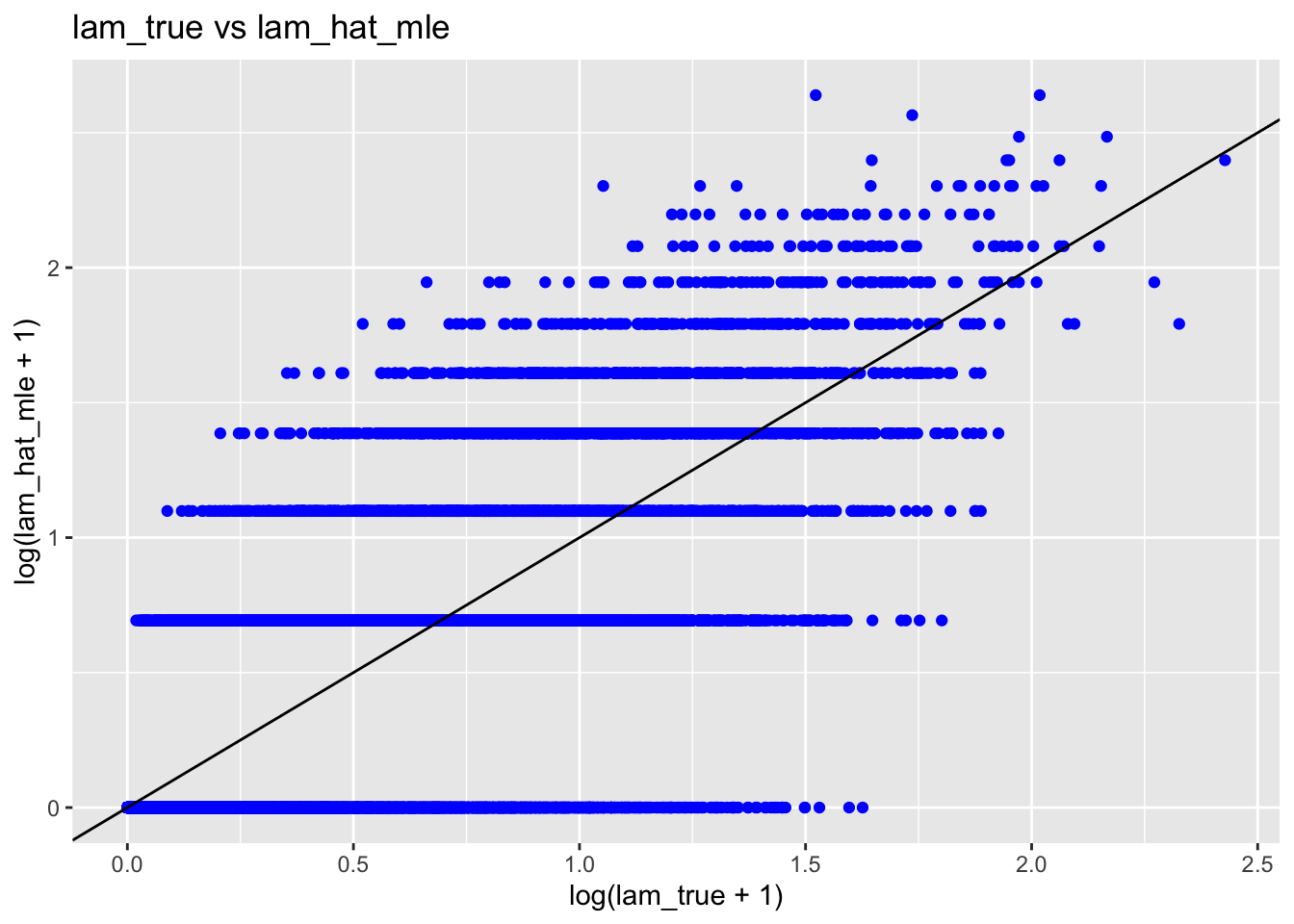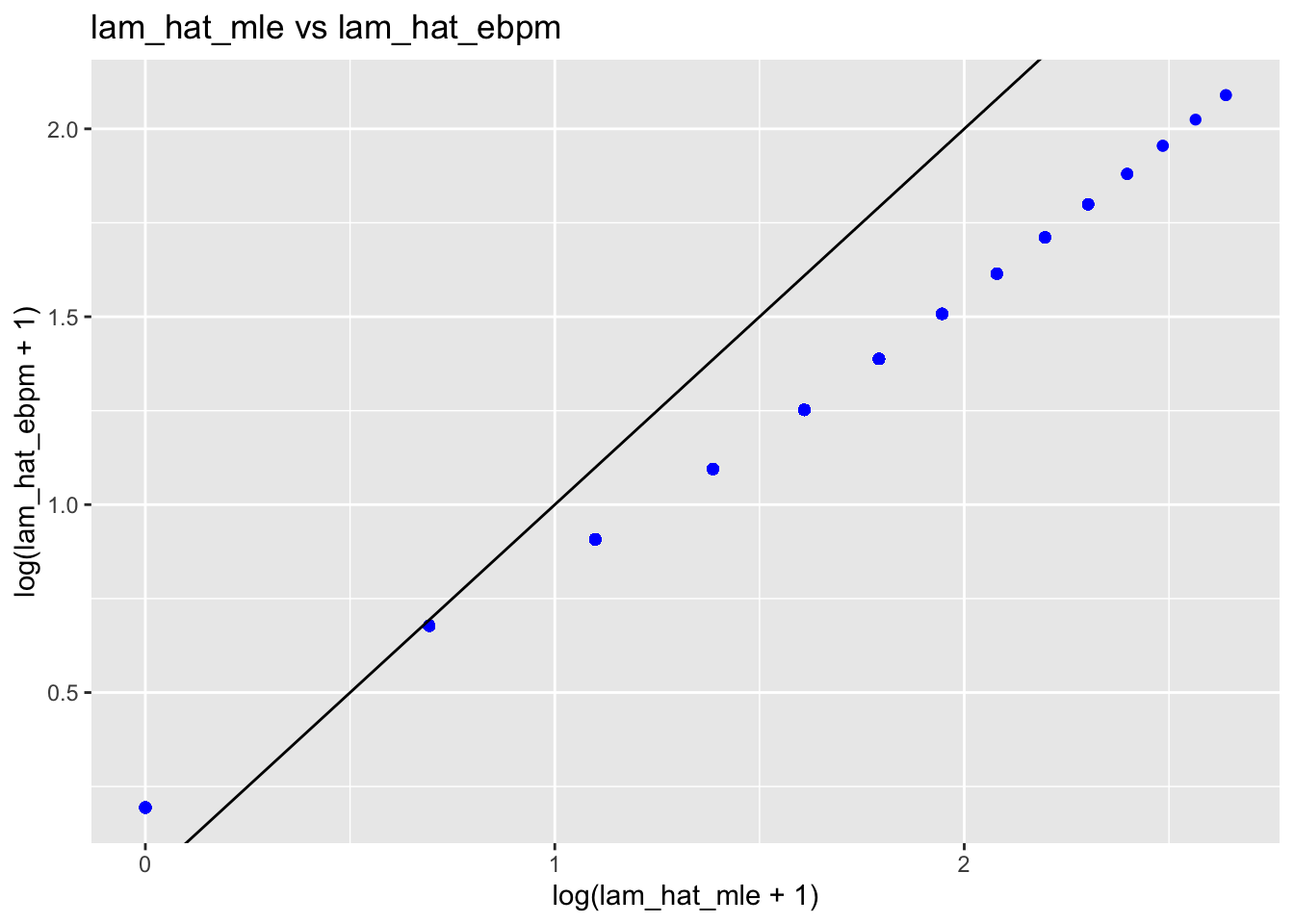vignette_ebpm2
zihao12
2019-10-20
Last updated: 2019-10-22
Checks: 7 0
Knit directory: ebpmf_demo/
This reproducible R Markdown analysis was created with workflowr (version 1.4.0). The Checks tab describes the reproducibility checks that were applied when the results were created. The Past versions tab lists the development history.
Great! Since the R Markdown file has been committed to the Git repository, you know the exact version of the code that produced these results.
Great job! The global environment was empty. Objects defined in the global environment can affect the analysis in your R Markdown file in unknown ways. For reproduciblity it’s best to always run the code in an empty environment.
The command set.seed(20190923) was run prior to running the code in the R Markdown file. Setting a seed ensures that any results that rely on randomness, e.g. subsampling or permutations, are reproducible.
Great job! Recording the operating system, R version, and package versions is critical for reproducibility.
Nice! There were no cached chunks for this analysis, so you can be confident that you successfully produced the results during this run.
Great job! Using relative paths to the files within your workflowr project makes it easier to run your code on other machines.
Great! You are using Git for version control. Tracking code development and connecting the code version to the results is critical for reproducibility. The version displayed above was the version of the Git repository at the time these results were generated.
Note that you need to be careful to ensure that all relevant files for the analysis have been committed to Git prior to generating the results (you can use wflow_publish or wflow_git_commit). workflowr only checks the R Markdown file, but you know if there are other scripts or data files that it depends on. Below is the status of the Git repository when the results were generated:
Ignored files:
Ignored: .Rhistory
Ignored: .Rproj.user/
Untracked files:
Untracked: analysis/.ipynb_checkpoints/
Untracked: analysis/ebpmf_demo.Rmd
Untracked: analysis/ebpmf_rank1_demo2.Rmd
Untracked: analysis/softmax_experiments.ipynb
Untracked: data/trash/
Untracked: docs/figure/Experiment_ebpmf_rankk.Rmd/
Untracked: docs/figure/test.Rmd/
Untracked: verbose_log_1571583163.21966.txt
Untracked: verbose_log_1571583324.71036.txt
Untracked: verbose_log_1571583741.94199.txt
Untracked: verbose_log_1571588102.40356.txt
Unstaged changes:
Modified: analysis/debug_ebpmf_exponential_mixture.Rmd
Modified: analysis/ebpmf_rank1_demo.Rmd
Modified: analysis/ebpmf_rankk_demo.Rmd
Modified: analysis/softmax_experiments.Rmd
Note that any generated files, e.g. HTML, png, CSS, etc., are not included in this status report because it is ok for generated content to have uncommitted changes.
There are no past versions. Publish this analysis with wflow_publish() to start tracking its development.
EBPM problem
\[ \begin{align} & x_i \sim Pois(s_i \lambda_i)\\ & \lambda_i \sim g(.)\\ & g \in \mathcal{G} \end{align} \] Our goal is to estimate \(\hat{g}\) (MLE), then compute posterior \(p(\lambda_i | x_i, \hat{g})\). Here I use point gamma (spike-and-slab) as prior family.
See model details and derivations in https://github.com/stephenslab/ebpm/blob/master/derivations/ebpm.pdf
devtools::load_all("../ebpm")Loading ebpmset.seed(123)
library(ebpm)
library(ggplot2)
library(gtools)
require(gridExtra)Loading required package: gridExtraexperiment setup
I simulate data from the mixture of exponential, and compare fitting the poisson mean problem with MLE (\(\hat{\lambda}^{mle}_i = \frac{x_i}{s_i}\)), and ebpm_exponential_mixture with different options.
For ebpm, the options are: * fit_true_g: use the true \(g\)
* fit_true_scale: use the true mixture components to estimate \(\hat{g}\) * fit_est_scale: estimate mixture components from data, then estimate \(\hat{g}\)
## simulate data
n = 20000
sim = ebpm::simulate_pois_point_gamma(n, g_init = point_gamma(0.4,1,1))
hist(log(sim$x+1), breaks = 100, xlab = "log(x + 1)", main = "hist for log(x + 1)")
rmse <- function(x,y){
return(sqrt(mean((x-y)^2)))
}
methods = c()
ll_gs = c()
rmses = c()
## true
methods = c(methods, "true")
ll_gs = c(ll_gs, sim$ll)
rmses = c(rmses, 0)
## MLE
methods = c(methods, "mle")
ll_gs = c(ll_gs, NA)
rmses = c(rmses, rmse(sim$x/sim$s, sim$lam))
## fit (with known g)
fit = ebpm::ebpm_point_gamma(x = sim$x, s = sim$s, g_init = sim$g, fix_g = T)
methods = c(methods, "fit_true_g")
ll_gs = c(ll_gs, fit$log_likelihood)
rmses = c(rmses, rmse(fit$posterior$mean, sim$lam))
rm(fit)
## fit (estimate scale)
fit = ebpm::ebpm_point_gamma(x = sim$x, s = sim$s)
methods = c(methods, "fit_est_g")
ll_gs = c(ll_gs, fit$log_likelihood)
rmses = c(rmses, rmse(fit$posterior$mean, sim$lam))
rm(fit)
data.frame(method = methods, ll_g = ll_gs, rmse = rmses) method ll_g rmse
1 true -20247.31 0.0000000
2 mle NA 0.7742208
3 fit_true_g -20247.31 0.5822832
4 fit_est_g -20245.22 0.5824073plot the \(\lambda\)s
fit = ebpm::ebpm_point_gamma(x = sim$x, s = sim$s)
df = data.frame(lam_true = sim$lam,lam_hat_mle = sim$x/sim$s, lam_hat_ebpm = fit$posterior$mean)
ggplot(df)+
geom_point(aes(x = log(lam_true + 1), y = log(lam_hat_ebpm +1)), color = "blue")+
geom_abline(slope = 1, intercept = 0)+
guides(fill = "color")+
ggtitle("lam_true vs lam_hat_ebpm")
ggplot(df)+
geom_point(aes(x = log(lam_true + 1), y = log(lam_hat_mle + 1)), color = "blue")+
geom_abline(slope = 1, intercept = 0)+
guides(fill = "color")+
ggtitle("lam_true vs lam_hat_mle")
ggplot(df)+
geom_point(aes(x = log(lam_hat_mle + 1), y = log(lam_hat_ebpm + 1)), color = "blue")+
geom_abline(slope = 1, intercept = 0)+
guides(fill = "color")+
ggtitle("lam_hat_mle vs lam_hat_ebpm")
With outliers
What if there are outliers in our data? I add a few very numbers to the original data. Let’s see what will ebpm and MLE give us:
n_outlier = 10
sim2 = sim
sim2$x = c(sim2$x, runif(n_outlier, 1e+4, 1e+5))
sim2$s = c(sim$s, replicate(n_outlier, 1))
fit2 = ebpm::ebpm_point_gamma(x = sim$x, s = sim$s)
## MLE estimate
tail(sim2$x/sim2$s, n_outlier) [1] 82892.51 66284.71 36595.39 95580.53 98246.45 57903.75 99663.95
[8] 46440.66 32593.94 26183.92## `ebpm` estimate
tail(fit2$posterior$mean, n_outlier) [1] 0.2140541 0.2140541 0.2140541 2.4975590 0.9693591 0.2140541 0.2140541
[8] 0.2140541 0.2140541 0.2140541So ebpm shrinks those abnormally big data towards smaller values.
sessionInfo()R version 3.5.1 (2018-07-02)
Platform: x86_64-apple-darwin15.6.0 (64-bit)
Running under: macOS 10.14
Matrix products: default
BLAS: /Library/Frameworks/R.framework/Versions/3.5/Resources/lib/libRblas.0.dylib
LAPACK: /Library/Frameworks/R.framework/Versions/3.5/Resources/lib/libRlapack.dylib
locale:
[1] en_US.UTF-8/en_US.UTF-8/en_US.UTF-8/C/en_US.UTF-8/en_US.UTF-8
attached base packages:
[1] stats graphics grDevices utils datasets methods base
other attached packages:
[1] gridExtra_2.3 gtools_3.8.1 ggplot2_3.2.1 ebpm_0.0.0.9001
[5] testthat_2.2.1
loaded via a namespace (and not attached):
[1] Rcpp_1.0.2 pillar_1.4.2 compiler_3.5.1
[4] git2r_0.25.2 workflowr_1.4.0 prettyunits_1.0.2
[7] remotes_2.1.0 tools_3.5.1 digest_0.6.21
[10] pkgbuild_1.0.3 pkgload_1.0.2 tibble_2.1.3
[13] gtable_0.3.0 evaluate_0.14 memoise_1.1.0
[16] pkgconfig_2.0.3 rlang_0.4.0 cli_1.1.0
[19] rstudioapi_0.10 yaml_2.2.0 xfun_0.8
[22] dplyr_0.8.1 withr_2.1.2 stringr_1.4.0
[25] knitr_1.25 desc_1.2.0 fs_1.3.1
[28] devtools_2.2.1.9000 tidyselect_0.2.5 grid_3.5.1
[31] rprojroot_1.3-2 glue_1.3.1 R6_2.4.0
[34] processx_3.3.1 rmarkdown_1.13 sessioninfo_1.1.1
[37] mixsqp_0.1-121 purrr_0.3.2 callr_3.2.0
[40] magrittr_1.5 scales_1.0.0 backports_1.1.5
[43] ps_1.3.0 ellipsis_0.3.0 htmltools_0.3.6
[46] usethis_1.5.1 assertthat_0.2.1 colorspace_1.4-1
[49] labeling_0.3 stringi_1.4.3 lazyeval_0.2.2
[52] munsell_0.5.0 crayon_1.3.4